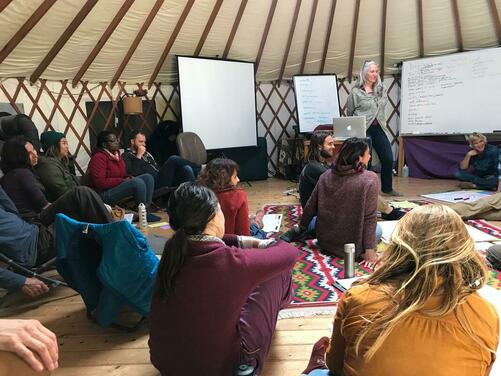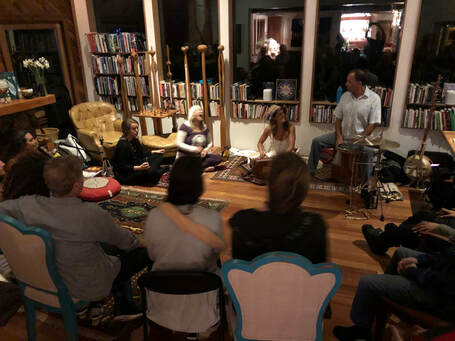Urban Permaculture Guild & Woodland Institute and Retreat Center
 Suitably, we met on in a busy street-side café in downtown San Rafael. Kat Steele was Director of the Urban Permaculture Guild from its inception until 2008, when she left to become the Sustainable Development Manager of the Esalen Institute until 2015. After leaving that position, she launched and still runs the Woodland Institute and Retreat Center in Fairfax, CA. When I asked Kat to share with me what her ‘title’ is, she paused, contemplating for a second, then said “permaculture educator and activist, and Climate Reality leader.”
Suitably, we met on in a busy street-side café in downtown San Rafael. Kat Steele was Director of the Urban Permaculture Guild from its inception until 2008, when she left to become the Sustainable Development Manager of the Esalen Institute until 2015. After leaving that position, she launched and still runs the Woodland Institute and Retreat Center in Fairfax, CA. When I asked Kat to share with me what her ‘title’ is, she paused, contemplating for a second, then said “permaculture educator and activist, and Climate Reality leader.”
At 24, as media maker with Universal Studios, Kat worked on a project in the former Soviet Union. The group arrived in Kazakhstan, where Kat vividly recalled having “met with the people who had been harmed by nuclear radiation poisoning…it was very heart opening and mind blowing and activist-making.” Shortly after, she visited an intentional, international, spiritual community where she saw what was possible with both healthy communities and a positive relationship with nature. It was in the these worlds of activism and creative expression that Kat found her home, which she had never discovered in her traditional mainstream catholic upbringing in Miami, FL.
After visiting the former Soviet Union and her first intentional community, Kat enrolled in her first PDC decades ago. The experience, although beautiful regarding in the concepts and potential, resulted in anger and frustration at the rural farming and ranching focus. “I was living in Oakland at the time and my daily experience was with people with very little economic means, a lot of racial and economic diversity, lots of young activists who were struggling financially and it felt like a big disconnect. ‘Wow I’m learning all of this really amazing permaculture stuff but how does it really relate to me and my community? I don’t have a farm. I don’t have a husband and lots of children and a white picket fence. I don’t have land, so how does this relate to me?’ At that time I got really excited about this possibility of bringing permaculture to the urban setting.”
So Kat formed the Urban Permaculture Guild. She was living in Oakland, CA, when growing food in the city wasn’t very popular. Through an outlet of helping people grow gardens in urban front and back yards, Kat interwove permaculture design as a way to help people “gain more empowerment by seeing the world through a permaculture lens.”
Now, permaculture weaves its way into Kat’s daily life is as “a platform, a view, a perspective that I can use in making very simple daily choices about how I spend my time and money and energy. What food I put in my body. My politics. Where I can use my power to uplift people that may not have as much privilege as I do…to recognize the parts of my inner world that have been colonized by patriarchy or consumerism.”
From those earlier days in the permaculture movement to now, Kat is feeling hopeful. “I am very heartened and inspired by the recent shift in perspective around the value and also upliftment of the voices of indigenous people who have inspired so much of what permaculture design is all about – that love of the land, the relationship, that reciprocity. There’s a huge opportunity for more inclusion in the permaculture movement…and I also think that in the past two years especially there’s a lot more women practitioners and leaders in the movement, there’s a lot more men in the movement who have a deeper understanding about how the lack of inclusion has impacted them and all of us and I see a lot of waking up that’s happening.” In the form of movements ranging from “Me Too!” to youth globally walking out on classes and demanding action on climate change, we have woken up and are taking action. On this national journey, I’m learning what may be the most critical role of permaculture in serving as a platform to guide that awakening into solutions-based thinking.

Recent Posts

